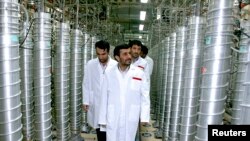Iran says it has agreed with United Nations inspectors on "some points" on its nuclear program.
Iran's state-run news agency said Wednesday that some differences were resolved and new proposals made that would be brought up in the next meeting.
It gave no details and the International Atomic Energy Agency had no immediate comment.
The IAEA team is in Tehran for a new round of talks aimed at letting inspectors visit Iranian nuclear sites. Talks last month failed to produce any agreement. But Tehran has hinted that it may let inspectors visit the Parchin military site, which Western nations suspect is being used to build a nuclear weapon. Iran says it is a conventional military site and insists its nuclear program is strictly for peaceful purposes.
Also Wednesday, Iran said it is upgrading some key equipment at its main uranium enrichment facility.
2013
January: Iran says it will speed up nuclear fuel work.
February: Iran's supreme leader Ayatollah Ali Khamenei rejects direct nuclear talks with the US.
2012
January: IAEA confirms Iran is refining uranium to 20% fissile purity.
February: UN inspectors end talks in Tehran without inspecting disputed military site at Parchin.
April: Iranian President Mahmoud Ahmadinejad vows Iran will not surrender its nuclear rights.
May: UN inspectors report they found find traces significantly upgraded uranium at an Iranian site.
July: EU begins total ban on Iranian oil imports, US expands sanctions.
September: IAEA demands access to Parchin, Iran calls EU sanctions "irresponsible."
December: IAEA says it makes progress in talks with Iran. US imposes more sanctions.
The head of Iran's nuclear energy organization, Fereydoon Abbasi-Davani, told state-run media workers have begun installing a new generation of centrifuges at its Natanz facility.
The upgraded centrifuges are capable of producing highly-enriched uranium needed for nuclear weapons.
European Union foreign policy chief Catherine Ashton told the U.N. Security Council Wednesday she is hopeful some progress can be made in talks planned for later this month with Iran.
"There is no doubt that the pressure of sanctions has been instrumental in bringing Iran back to the negotiating table. But sanctions cannot be an end in themselves," Ashton said. "The key is for Iran to comply fully with its international obligations."
Ashton has been coordinating talks between world powers and Iran. The next round of talks involving the United States, Britain, China, France, Russia, Germany and Iran is scheduled for February 26 in Kazakhstan.
Iran's state-run news agency said Wednesday that some differences were resolved and new proposals made that would be brought up in the next meeting.
It gave no details and the International Atomic Energy Agency had no immediate comment.
The IAEA team is in Tehran for a new round of talks aimed at letting inspectors visit Iranian nuclear sites. Talks last month failed to produce any agreement. But Tehran has hinted that it may let inspectors visit the Parchin military site, which Western nations suspect is being used to build a nuclear weapon. Iran says it is a conventional military site and insists its nuclear program is strictly for peaceful purposes.
Also Wednesday, Iran said it is upgrading some key equipment at its main uranium enrichment facility.
Iran Nuclear Standoff:
Developments in Iran Nuclear Standoff:2013
January: Iran says it will speed up nuclear fuel work.
February: Iran's supreme leader Ayatollah Ali Khamenei rejects direct nuclear talks with the US.
2012
January: IAEA confirms Iran is refining uranium to 20% fissile purity.
February: UN inspectors end talks in Tehran without inspecting disputed military site at Parchin.
April: Iranian President Mahmoud Ahmadinejad vows Iran will not surrender its nuclear rights.
May: UN inspectors report they found find traces significantly upgraded uranium at an Iranian site.
July: EU begins total ban on Iranian oil imports, US expands sanctions.
September: IAEA demands access to Parchin, Iran calls EU sanctions "irresponsible."
December: IAEA says it makes progress in talks with Iran. US imposes more sanctions.
The upgraded centrifuges are capable of producing highly-enriched uranium needed for nuclear weapons.
European Union foreign policy chief Catherine Ashton told the U.N. Security Council Wednesday she is hopeful some progress can be made in talks planned for later this month with Iran.
"There is no doubt that the pressure of sanctions has been instrumental in bringing Iran back to the negotiating table. But sanctions cannot be an end in themselves," Ashton said. "The key is for Iran to comply fully with its international obligations."
Ashton has been coordinating talks between world powers and Iran. The next round of talks involving the United States, Britain, China, France, Russia, Germany and Iran is scheduled for February 26 in Kazakhstan.


